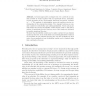Free Online Productivity Tools
i2Speak
i2Symbol
i2OCR
iTex2Img
iWeb2Print
iWeb2Shot
i2Type
iPdf2Split
iPdf2Merge
i2Bopomofo
i2Arabic
i2Style
i2Image
i2PDF
iLatex2Rtf
Sci2ools
118
click to vote
FROCOS
2007
Springer
2007
Springer
Combining Algorithms for Deciding Knowledge in Security Protocols
Abstract. In formal approaches, messages sent over a network are usually modeled by terms together with an equational theory, axiomatizing the properties of the cryptographic functions (encryption, exclusive or, . . . ). The analysis of cryptographic protocols requires a precise understanding of the attacker knowledge. Two standard notions are usually considered: deducibility and indistinguishability. Those notions are well-studied and several decidability results already exist to deal with a variety of equational theories. However most of the results are dedicated to specific equational theories. We show that decidability results can be easily combined for any disjoint equational theories: if the deducibility and indistinguishability relations are decidable for two disjoint theories, they are also decidable for their union. As an application, new decidability results can be obtained using this combination theorem.
Related Content
| Added | 07 Jun 2010 |
| Updated | 07 Jun 2010 |
| Type | Conference |
| Year | 2007 |
| Where | FROCOS |
| Authors | Mathilde Arnaud, Véronique Cortier, Stéphanie Delaune |
Comments (0)

